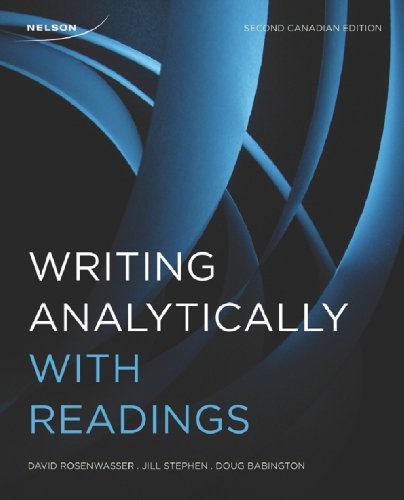- Writing Analytically 6th Edition Download Software
- Writing Analytically 6th Edition Download Full
- David Rosenwasser
- Next
Writing Analytically Epub Book Epub Book Writing Analytically Ebook 28,43MB Writing Analytically Epub Book Pursuing for Writing Analytically Epub Book Do you really need this file of Writing Analytically Epub Book It takes me 62 hours just to attain the right download link, and another 4 hours to validate it. Writing Analytically - 7th edition. By Rosenwasser. Cover type: Paperback. After purchasing your eTextbook or eChapter, you will be emailed instructions on where and how to download your free reader. Download Requirements: Due to the size of eTextbooks, a high-speed Internet connection (cable modem. Writing Analytically (6th Edition) by David Rosenwasser, Jill Stephen. Download $25.99 + 0.00 = $25.99: Download: 1 variants copy filtered out, starting from $34.66.
:Writing Analytically 6th Edition Download Software
About This Edition
From the Publisher
New Features
Writing Analytically 6th Edition Download Full

David Rosenwasser
- New introductory chapter. Chapter 1, 'Introduction to This Book, to College Writing, and to Thinking About Thinking,' shows users how they can take best advantage of the text and its features. For instance, the chapter includes a series of 15 'Short Takes' that forecast the modular organization of the text and serve as a reference tool for locating extended topical discussions throughout the text.
- New 'Toolkit' chapters. The extraordinary Writing Analytically heuristics are now divided into two 'Toolkits of Analytical Methods' chapters. The first 'Toolkit' chapter (Chapter 2) equips the user with foundational observation techniques, while the second (Chapter 4) provides activities that allow the user to extend and deepen his analysis.
- Revised Chapter 3, 'Analysis.' This chapter maintains its focus on the 'Five Analytical' moves and now also includes discussion of the counterproductive habits of mind that often supplant effective analysis. There is a new example of the application of the 'Five Analytical' moves to a Harvard University commencement speech. New 'Try This' exercises are included in 'Description,' 'Inferring Implications from Observations,' and 'Applying the Five Analytical Moves to a Speech.' The chapter has new user writing examples from users of Biology, History, and English, and a professional writing from Jane Jacobs' The Death and Life of Great American Cities.
- Newly revised and expanded chapter on reading. Moved forward in the sixth edition, this chapter offers a more developed presentation of 'How to Read' with a new 'Try This' exercise called 'Writing and Reading with Others.' New examples of user writing in this chapter include responses to David Bartholomae's 'Inventing the University' essay. The reading chapter now has a new section on analyzing an audience and specific application of Uncovering Assumptions and Reformulating Binaries heuristics to Christopher Borick's essay, 'On Political Labels.' The chapter also has a new 'Voices form Across the Curriculum' section on critical reading, from a music Instructor's point of view.
- New Chapter 6, 'Interpretation and Argument. Combining the prior edition's chapters on Interpretation and Argument, this single, integrated chapter now illustrates how to make plausible claims and take reasonable positions.
- Expanded discussion of the thesis statement. Newly revised Unit II sequences two chapters on the Thesis Statement so that a user can study what makes a good thesis (Chapter 10) and then study a chapter about how to fix thesis statements (Chapter 11) that could be made more effective. These thesis chapters also contain new examples of user writing.
- Integrated 'Voices From Across the Curriculum' sections. These sections are now integrated throughout the text to more clearly illustrate the connections between writing and various academic disciplines.
Additional Features:
- In this book, the authors also show users what not to do, using the premise that users have a hard time developing new skills until they've come to understand what is counterproductive about their current practice.
- This book advocates locating observation as a separate phase of thinking before committing to a thesis. As writers and thinkers, we all need to slow down--to dwell longer in the open-ended, exploratory, information-gathering stage. So, the text supplies tasks for each phase of the writing and idea-generating process: making observations, inferring implications, and making the leap to possible conclusions.
- To make the book's arguments and advice clearer, easier to find, and more clearly incremental, the sixth edition of Writing Analytically is streamlined and organized into three units: (I) The Analytical Frame of Mind; (II) Writing Analytical Papers: How to Use Evidence, Evolve Claims, and Converse with Sources; and (III) Matters of Form: The Shapes that Thought Takes.
- Writing Analytically (Sixth Edition) centers on the concept of writing to learn: the idea that writing can facilitate and enrich users' understanding of their academic courses, and of their lives.
Further reference for this edition:
Download a transition guide [PDF] showing the changes from the fifth to the sixth edition of Writing Analytically.
About the Author:
David Rosenwasser teaches at Muhlenberg College, a small liberal arts college in Pennsylvania, where he has been since the late 1980s. He and Jill Stephen created and implemented the Writing Across the Curriculum program there through a series of faculty seminars. During these seminars, Dr. Rosenwasser and Dr. Stephen discovered that while content faculty from across the disciplines maintained disciplinary-specific writing protocols, they essentially wanted the same thing from student writing: analysis. From this premise, WRITING ANALYTICALLY was born. Dr. Rosenwasser received his B.A. from Grinnell College and his Ph.D. from the University of Virginia in the theory and history of narrative. His current interests include contemporary Irish literature and comic theory. His most recent literary papers include a study of the contemporary Irish writer Edna O'Brien in relation to the work of Joyce and Yeats as well as an analysis of the politics of Bruce Springsteen's albums during the Bush presidency, written collaboratively with a political science professor.
Next
'About this title' may belong to another edition of this title.